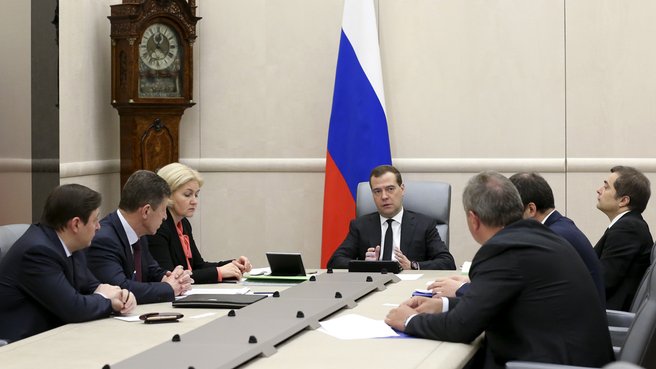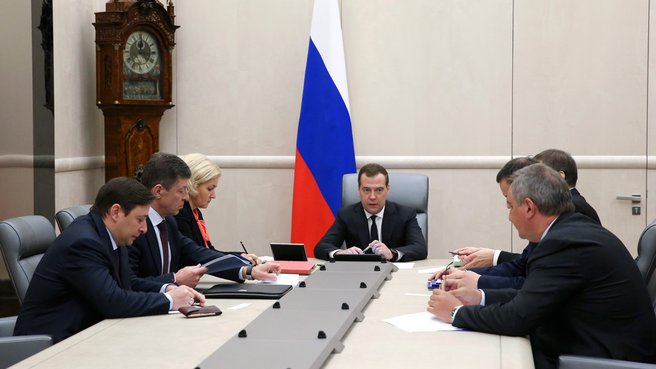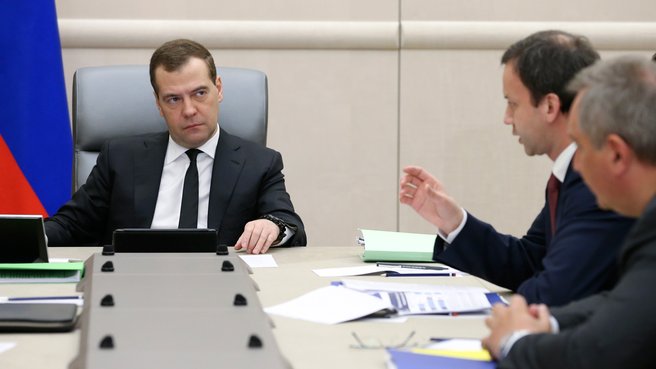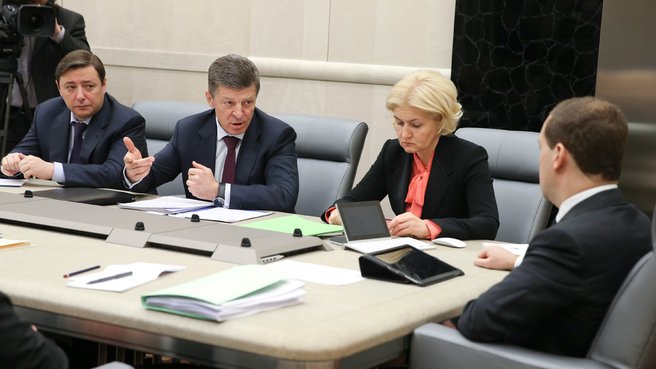Transcript of the beginning of the meeting:
Dmitry Medvedev: Let’s discuss some current issues.
The first thing I’d like to mention is the expiration of this year’s state defence contracts on April 15. This concerns research and development programmes, the delivery and disposal of weapons, military equipment, chemical weapons as well as mobilisation preparations. We have always adhered to the contract terms. But to be honest, these contracts haven’t always been successful, with too many delays, etc. This year, the total volume of defence orders and the jobs within the orders have increased by about 8%.
Mr Rogozin (addressing Dmitry Rogozin), how’s it going now? What’s the current status of state defence contracts? What’s been accomplished and what hasn’t?
Dmitry Rogozin: Mr Medvedev, we worked with the Government last year to develop a system of control over the signing and implementation of these contracts, and we have achieved some results.
Dmitry Medvedev: By tightening up.
Dmitry Rogozin: I’d say the measures are more preventive than tightening. First, the Government now oversees the work of the Federal Service for Defence Contracts, which exercises control over the contracts by tightening regulations both for state agencies and the contractors. The Military-Industrial Commission monitors the fulfillment of defence contracts every week. Consequently, the volume of state defence contracts continues to increase each year, despite all the problems, and more complicated objectives are set forth. Nevertheless, the statistics are quite dynamic, and they show that the situation continues to improve gradually, even on 2012, although that year …
Dmitry Medvedev: What is the situation like today?
Dmitry Rogozin: The situation is as follows: The volume of state contracts, including supplementary agreement to these state contracts that have been signed by the Defence Ministry accounted for 67.5% of total state defence contracts costs, or about 3.2% more than in 2012.
Dmitry Medvedev: In other words, two-thirds?
Dmitry Rogozin: Yes. Here is the breakdown:
- Foreign Intelligence Service: 96.7%;
- Federal Drug Control Service: 96.4%;
- Federal Body Guards Service: 84.6%;
- Interior Ministry: 72.4%;
- Federal Security Service: 66.1%.
The Federal Penitentiary Service is the worst performer, with just 46.5%, although this is hard to understand because they …
Dmitry Medvedev: This contract volume is rather unimpressive compared to …
Dmitry Rogozin: Yes, this is small, but, nevertheless, there are some questions concerning this figure …Rosatom, a traditional top performer, has 99.6%. We would like to note some problems that still exist in the defence-contract planning process that existed several years ago, while briefly summing up specific results. And, of course, there are problems associated with the timely provision of feasibility studies and other calculations and estimates by the enterprises themselves. In effect, both sides did not perform very well in this respect. Nevertheless, the trends are positive, and, on the whole, we hope very much that the defence contract will be fulfilled before the year is out.
Speaking of presidential projects, as for what these financial statistics conceal in terms of specific weapons systems, military and special-purpose equipment, Mr Medvedev, I would like to tell you about this in private.
Dmitry Medvedev: Of course, it is good that we are posting positive trends. But, to be honest, two-thirds can hardly be called a good result. This means that we have made mistakes in planning and carrying out this contract campaign. And, of course, all departments, including the Defence Ministry and other law-enforcement agencies, should pay attention to these facts. Naturally, smaller volumes make it possible to sign these state contracts more easily.
In any case, we must try to attain other statistics by this period, because even the planning of work for the current year amounts to financial allocations, and the management of our enterprises are always trying to say that they are not given money on time or that there are delays for some other reasons. This means that this campaign should proceed more quickly. You have noted correctly that this is a two-way street. And the departments must work faster, and enterprises must advance attractive terms making it possible to sign these contracts. This is the only way to receive funding as soon as possible and to start working with their help already this year. In general, please monitor this situation and report to me.
Dmitry Rogozin: All right, Mr Medvedev.
Dmitry Medvedev: And now let’s discuss the energy issue. There is an issue that does not have to do with the traditional Russian hydrocarbon energy sector. We devote a lot of attention to this sector, and the situation here is more or less clear. We should also address the issue of new energy sources, including renewable energy sources, such as solar energy, wind energy and some other types of renewable energy.
Our huge country has diverse landscapes. When flying around Europe, you see that it is small, but that new energy-generating systems are located everywhere. Unfortunately, Russia still has very few of these systems. But this does not mean that we should renounce traditional sources of energy in favour of new sources because, thank God, we have enough traditional sources, which will last for years to come. Nevertheless, this proportion should change. Obviously, we need to increase the proportion of some technologies several times over in a matter of a few years. We have set this goal. And we need to create the required regulatory framework wherever is necessary, we need to modify this regulatory framework, taking into account our membership in the World Trade Organisation. Mr Dvorkovich (Addressing Arkady Dvorkovich), this is your field, you are dealing with these issues. What has been accomplished?
Arkady Dvorkovich: Mr Medvedev, colleagues. The relevant legislation, which is needed to develop renewable energy sources, already exists in the form of federal laws. We have all essential regulatory standards and budget subsidies linked with grid-connection expenses. Every year, we allocate 100 million roubles as compensation for these grid-connections for renewable energy sources. You have instructed us to draft a special resolution that will make it possible to increase investment in these energy-generation sources, primarily solar energy, wind energy and small hydroelectric stations. This draft resolution has been finalised, and it can be signed already this week. We are talking about annual competitions between investment projects that use renewable energy sources, for the right to obtain payments for the energy being generated over a period of 15 years after putting any specific facility on stream, with guaranteed 14% investment recoupment rates. The total amount of electricity to be offered for the biddings is limited to about 6 GW in order to avoid overburdening on consumers, because the cost of this kind of power generation is higher than the cost of conventional generation. Nevertheless, we should develop this kind of technical expertise along with the appropriate production processes. With regard to this, the biddings will include a requirement for the localisation of the equipment that will be used for creating these facilities. The localisation level will gradually increase from 20% in 2013-2014 to 65-70% by 2020.
It is assumed that the first round of biddings will be held in the Russian Far East and in northern and southern Russia in 2013. Since we are about to hold biddings in particular, we expect to see lower amounts of declared initial investments and operating costs. The competition will be strong; there will be a lot of competing companies, so the tariff burden on consumers will be minimised. We expect it to amount to not more than two percentage points in the total amount of tariffs to the year 2020, and during this time tariffs will rise overall by about 40%-50%. If the biddings are effective, the increase will not exceed 1%. In other words, this small additional burden on the country will help us to develop the technology and set up a fairly large amount of renewable energy sources across Russia.
Dmitry Medvedev: The bottom line is that you need to work on it. If you don’t create a legal framework and do not invest in production, then these figures will not change, and we will be stuck in the hydrocarbon model forever and will, of course, lag behind the trends that have developed in most developed countries.
How are things in agriculture?
Arkady Dvorkovich: Sowing is underway in southern Russia, and according to the reports from the Stavropol and the Krasnodar territories everything is on schedule in terms of the projected sowing and the level of preparations. This week, we will hold an additional conference call about crop and livestock production and we will make a decision on the allocation of additional budgetary support.
Dmitry Medvedev: These decisions should be made quickly, and the funds should be distributed among regions as soon as possible. I talk with the governors occasionally. The governors of the regions where the sowing is underway – and this also applies to certain types of livestock production – say that they need the support now and that several agricultural enterprises have already received the money. Tomorrow, we have a meeting on livestock that we have been planning to hold for a long time, especially considering the situation in the pork and poultry production in part.
Another important issue is housing and utilities. One-third of complaints received by the Government are about housing and utilities. Mounting bills for inferior service are high on the list of these complaints. Customers are willing to pay more, but only if the service gets better. Bills are going up, but the quality isn't, so, in addition to the measures undertaken by the Government, governors should also create their own regulatory frameworks to this end.
I signed a resolution in early April that outlined the services required to maintain a block of flats properly. Included on the list are almost 100 types of work. The State Duma is considering another draft law that provides for mandatory self-regulation in the housing and utilities sector and the establishment of effective oversight over management companies. This work is also underway.
How are things is general, Mr Kozak? What else do we need to do?
Dmitry Kozak: This is a big issue, indeed, and much work is currently being done to improve the way housing and utilities work. We are addressing three issues at once: primarily, we are focusing on making utility services affordable, meaning that the cost of services should be in line with the level of the customers’ income; second, we are focusing on improving the quality of services, for which large investments are necessary; and the third task is to create conditions for attracting private investment in this sector.
Improving the conditions and the mechanisms underlying the operations of the companies that manage blocks of flats is one of the most important areas of our work. Resolution No. 290-e (it received its number on April 3) is designed to ensure the transparency and quality of work of the management companies. Up until now, there were about 40 different regulations in this sphere that were advisory or declarative in nature. They were based on the assumption that residents will set the list of maintenance activities to be performed by a management company and determine their cost at their general meetings (this is still required by the Housing Code). However, these regulations remain on paper, because residents aren’t particularly interested in doing this kind of work.
This is exactly why it was decided to adopt a detailed list of basic types of work to be carried out in a block of flats in order to maintain it properly. In fact, it’s a fair thing to do. It doesn’t concern only the people who live in a certain block of flats. It also affects the interests of the people who live in nearby blocks of flats, and so on. This list includes mandatory maintenance of public spaces in a block of flats, such as stairs, entrance doors, contiguous areas, and safety inspections of all major building structures.
All these measures, including over 100 types of work, will be required for both managing companies and general meetings of residents. This will also provide an additional tool for local governments (since they are primarily responsible for overseeing the proper maintenance of blocks of flats) and for state housing oversight authorities in charge of quality control of these companies. In addition to the bill that we just talked about, which provides for the introduction of additional municipal control over the companies (even though the law is named On Self-Regulation, it’s about state regulation of managing companies that are operating as free-market companies), this should significantly improve the quality of managing companies, ensure their transparency and create proper conditions for housing maintenance and reduce the number of buildings in need of major repairs, and the number of dilapidated and structurally unsafe buildings that require additional investment both by residents and the state.
Dmitry Medvedev: If I remember correctly, the draft law you are referring to does not apply to regular homeowner associations?
Dmitry Kozak: You mean regular homeowner associations that were established…
Dmitry Medvedev: Yes, regular homeowner associations.
Dmitry Kozak: … at one building and do not require any permits to access the market?
Dmitry Medvedev: Correct. Regular homeowner associations, which we advocated so much, will not be covered by these regulations.
Dmitry Kozak: No additional requirements or state control is required. We are proceeding from the assumption that residents have organised themselves and created a real homeowner association. In cases where one homeowner association covers large housing developments, we understand that they are most likely dummy operations and need to be looked into by law enforcement authorities.
Dmitry Medvedev: There must be oversight.
Dmitry Kozak: Yes, we are working on it.
Dmitry Medvedev: All right. A bus, though it does not belong to us, carried our people and children and it got into an accident in Belgium. Mr Rogozin, you are the chairman of the intergovernmental commission. It has already taken all major decisions. Thank God, all those who could be quickly brought back to Russia were brought back on several flights. However, badly injured passengers are still there. I would like you to thank our Belgian partners for the assistance, because it's always about how fast the response is. Our Emergencies Ministry also acted fast.
Dmitry Rogozin: Mr Medvedev, I will get in touch with the Belgian authorities and let them know what you said.
Dmitry Medvedev: Thank you.












